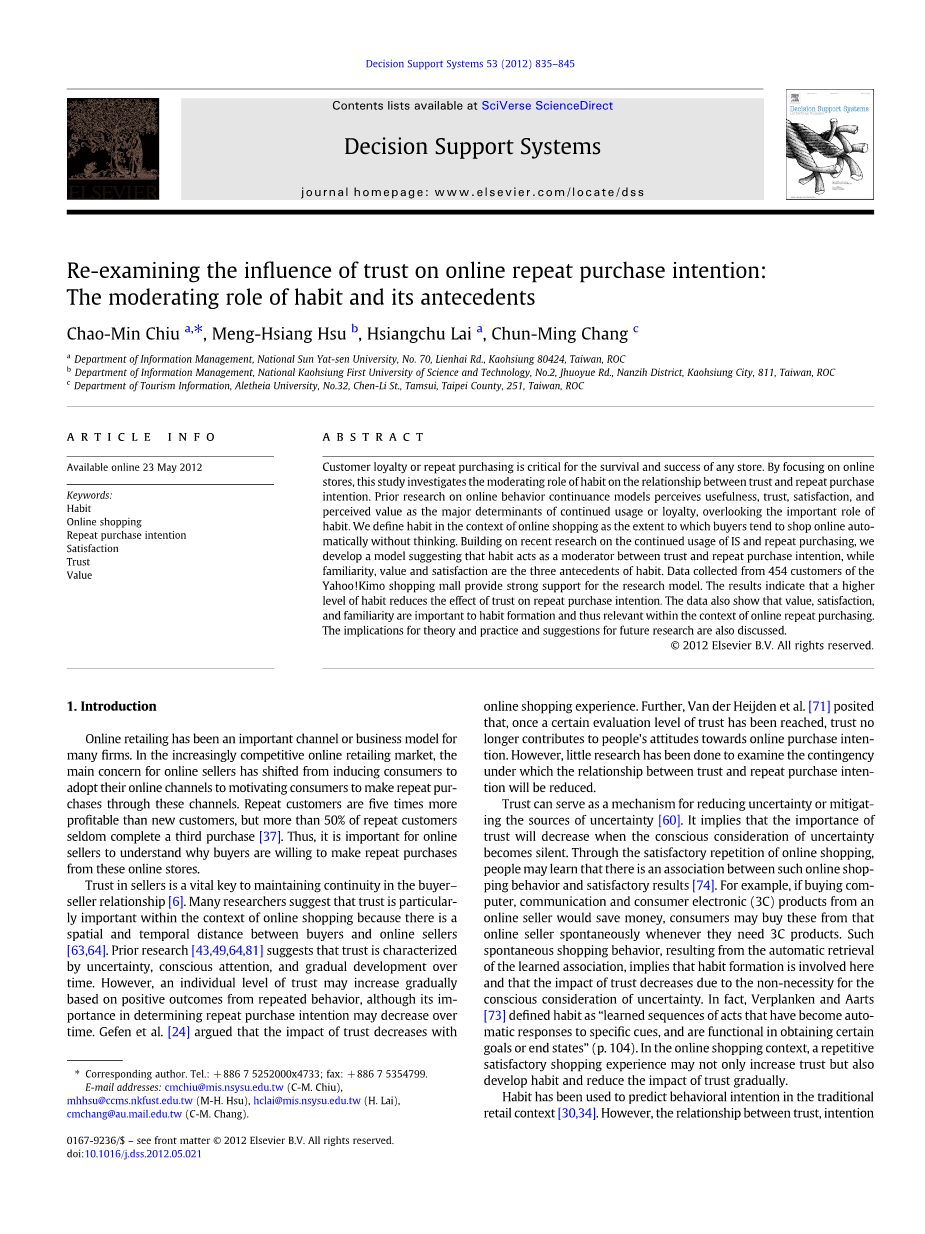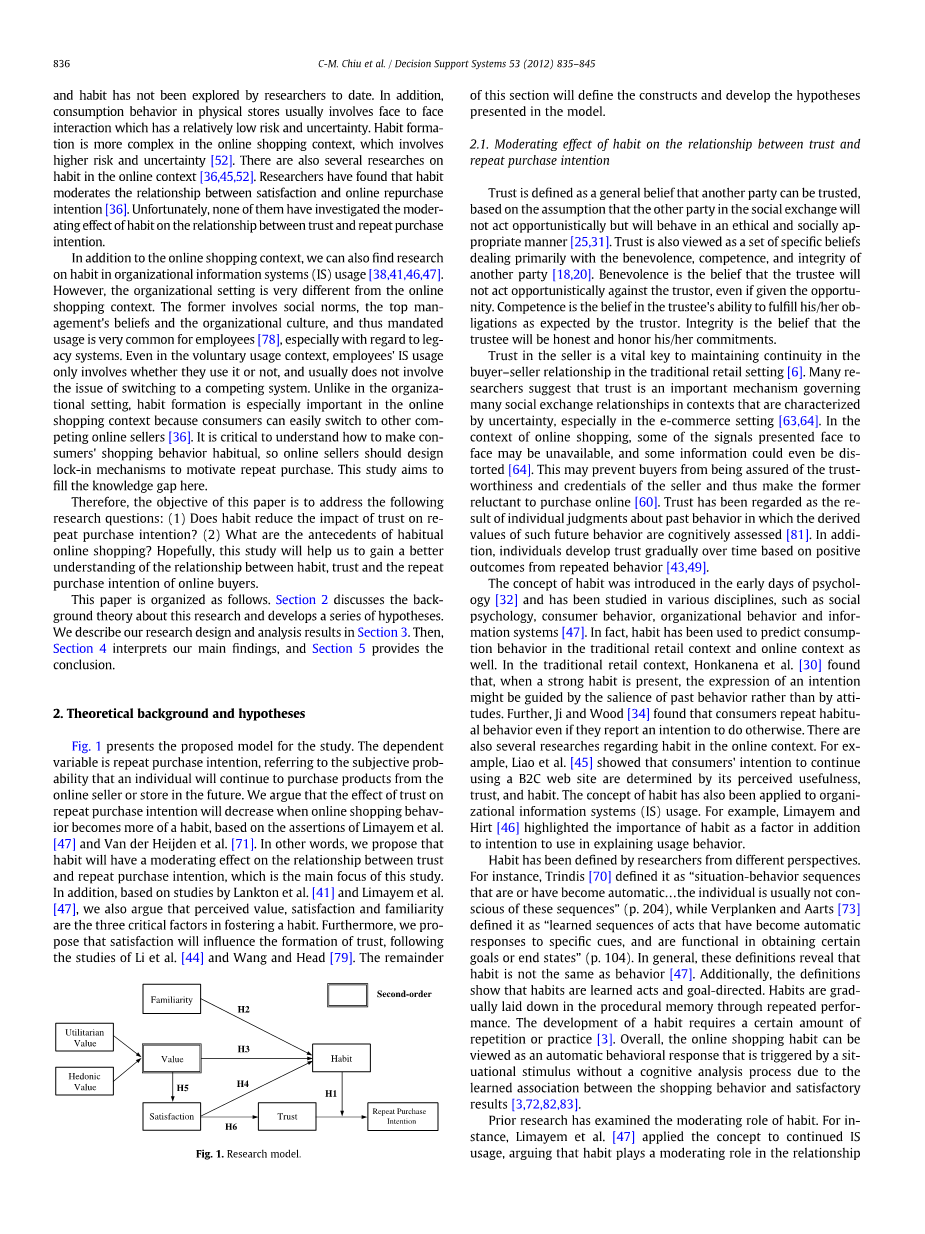消费者通过电商平台进行二手车交易的意愿影响因素研究外文翻译资料
2022-10-30 10:44:00


英语原文共 11 页,剩余内容已隐藏,支付完成后下载完整资料
原文
Decision Support Systems 53 (2012) 835–845
⁎ Corresponding author. Tel.: 886 7 5252000x4733; fax: 886 7 5354799.
E-mail addresses: cmchiu@mis.nsysu.edu.tw (C-M. Chiu),
mhhsu@ccms.nkfust.edu.tw (M-H. Hsu), hclai@mis.nsysu.edu.tw (H. Lai),
cmchang@au.mail.edu.tw (C-M. Chang).
0167-9236/$ – see front matter copy; 2012 Elsevier B.V. All rights reserved.
doi:10.1016/j.dss.2012.05.021
Contents lists available at SciVerse ScienceDirect
Decision Support Systems
journal homepage: www.elsevier.com/locate/dss
Re-examining the influence of trust on online repeat purchase intention:
The moderating role of habit and its antecedents
Chao-Min Chiu a,* , Meng-Hsiang Hsub , Hsiangchu Lai a, Chun-Ming Chang c
- Department of Information Management, National Sun Yat-sen University, No. 70, Lienhai Rd., Kaohsiung 80424, Taiwan, ROC
- Department of Information Management, National Kaohsiung First University of Science and Technology, No.2, Jhuoyue Rd., Nanzih District, Kaohsiung City, 811, Taiwan, ROC
- Department of Tourism Information, Aletheia University, No.32, Chen-Li St., Tamsui, Taipei County, 251, Taiwan, ROC
Article info
Available online 23 May 2012
Abstract
Customer loyalty or repeat purchasing is critical for the survival and success of any store. By focusing on online stores, this study investigates themoderating role of habit on the relationship between trust and repeat purchase intention. Prior research on online behavior continuance models perceives usefulness, trust, satisfaction, and perceived value as the major determinants of continued usage or loyalty, overlooking the important role of habit. We define habit in the context of online shopping as the extent to which buyers tend to shop online automatically without thinking. Building on recent research on the continued usage of IS and repeat purchasing, we develop a model suggesting that habit acts as a moderator between trust and repeat purchase intention, while familiarity, value and satisfaction are the three antecedents of habit. Data collected from 454 customers of the Yahoo!Kimo shopping mall provide strong support for the research model. The results indicate that a higher level of habit reduces the effect of trust on repeat purchase intention. The data also show that value, satisfaction, and familiarity are important to habit formation and thus relevant within the context of online repeat purchasing. The implications for theory and practice and suggestions for future research are also discussed.
keywords: Habit, Online shopping, Repeat purchase intention, Satisfaction, Trust Value
copy; 2012 Elsevier B.V. All rights reserved.
Introduction
Online retailing has been an important channel or business model for many firms. In the increasingly competitive online retailing market, the main concern for online sellers has shifted from inducing consumers to adopt their online channels to motivating consumers tomake repeat purchases through these channels. Repeat customers are five times more profitable than new customers, but more than 50% of repeat customers seldom complete a third purchase [37]. Thus, it is important for online sellers to understand why buyers are willing to make repeat purchases from these online stores. Trust in sellers is a vital key tomaintaining continuity in the buyer– seller relationship [6].Many researchers suggest that trust is particularly important within the context of online shopping because there is a spatial and temporal distance between buyers and online sellers [63,64]. Prior research [43,49,64,81] suggests that trust is characterized by uncertainty, conscious attention, and gradual development over time. However, an individual level of trust may increase gradually based on positive outcomes from repeated behavior, although its importance in determining repeat purchase intention may decrease over time. Gefen et al. [24] argued that the impact of trust decreases with online shopping experience. Further, Van der Heijden et al. [71] posited that, once a certain evaluation level of trust has been reached, trust no longer contributes to peoples attitudes towards online purchase intention. However, little research has been done to examine the contingency under which the relationship between trust and repeat purchase intention will be reduced. Trust can serve as a mechanismfor reducing uncertainty ormitigating the sources of uncertainty [60]. It implies that the importance of trust will decrease when the conscious consideration of uncertainty becomes silent. Through the satisfactory repetition of online shopping, people may learn that there is an association between such online shopping behavior and satisfactory results [74]. For example, if buying computer, communication and consumer electronic (3C) products from an online seller would save money, consumers may buy these from that online seller spontaneously whenever they need 3C products. Such spontaneous shopping behavior, resulting from the automatic retrieval of the learned association, implies that habit formation is involved here and that the impact of trust decreases due to the non-necessity for the conscious consideration of uncertainty. In fact, Verplanken and Aarts [73] defined habit as “learned sequences of acts that have become automatic responses to specific cues, and are functional in obtaining certain goals or end states” (p. 104).
⁎ Corresponding autho
剩余内容已隐藏,支付完成后下载完整资料
资料编号:[138415],资料为PDF文档或Word文档,PDF文档可免费转换为Word




